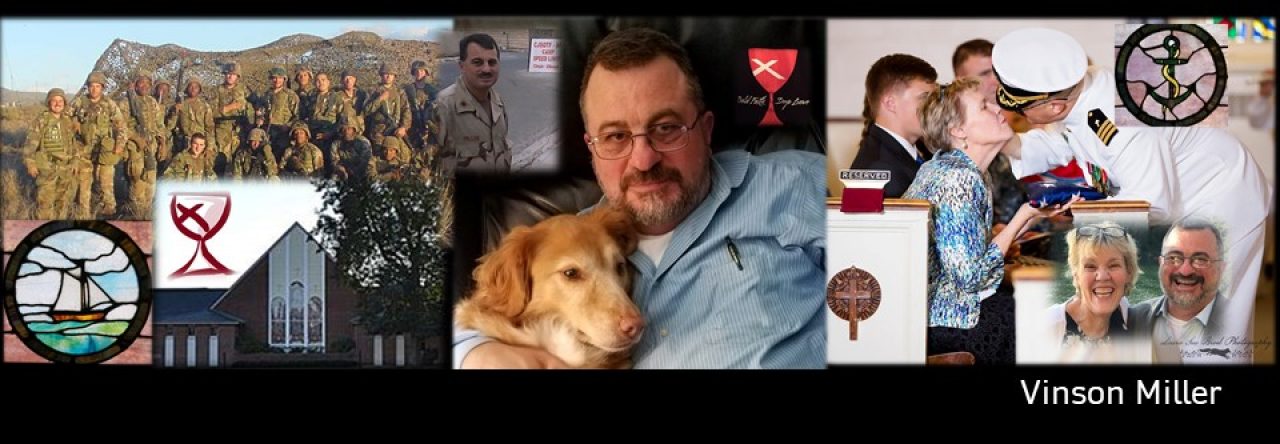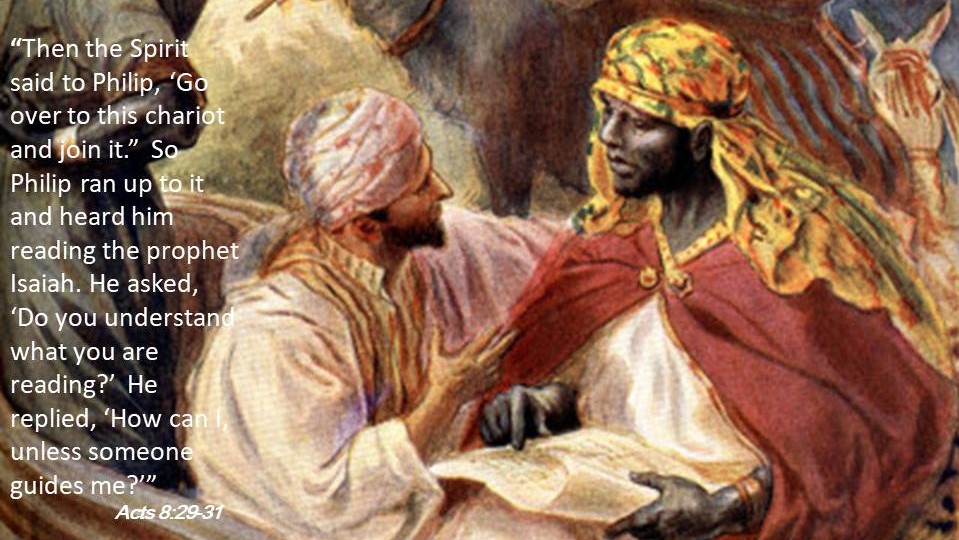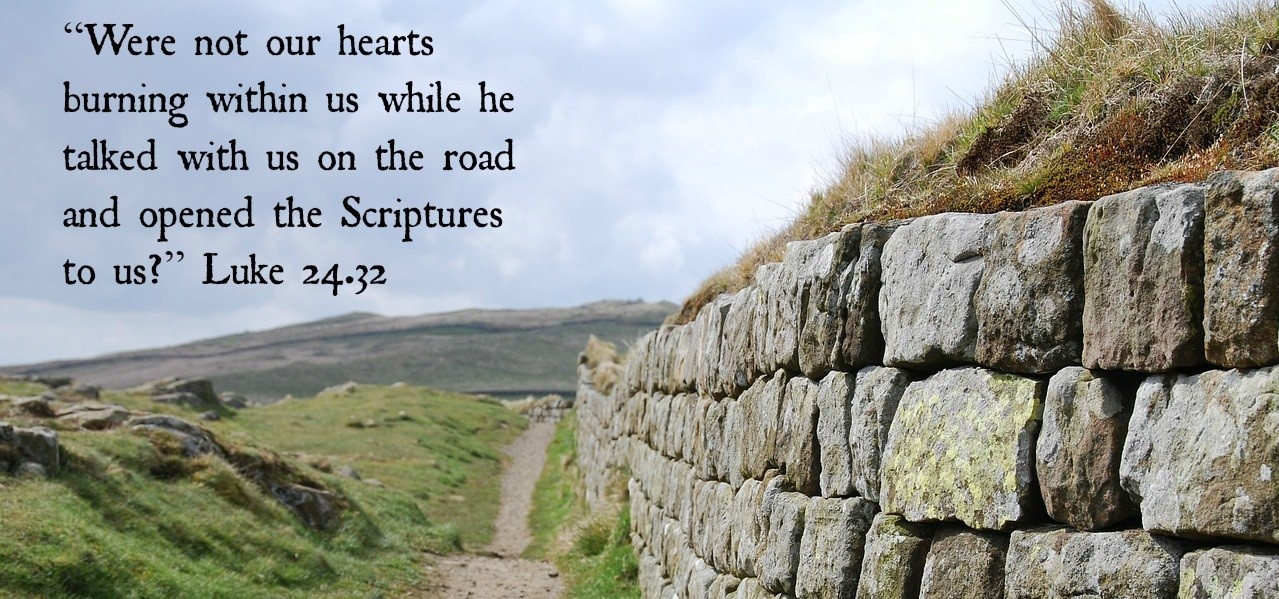Sermon of 29 April 2018, at First Christian Church of Hampton VA) on the fifth Sunday in Easter, as we inch toward Pentecost. It is not meant to wrap up everything in a bow, but to start you to thinking. Open to the Spirit, we can find ourselves amid interesting conversations, ones that stretch our limited thinking in new ways and a larger view of what God is doing even now.
________________________________________
BOOK OF ACTS 8:26-40 (New Revised Standard Version)
Then an angel of the Lord said to Philip, “Get up and go toward the south to the road that goes down from Jerusalem to Gaza.” (This is a wilderness road.) So he got up and went. Now there was an Ethiopian eunuch, a court official of the Candace, queen of the Ethiopians, in charge of her entire treasury. He had come to Jerusalem to worship and was returning home; seated in his chariot, he was reading the prophet Isaiah. Then the Spirit said to Philip, “Go over to this chariot and join it.” So Philip ran up to it and heard him reading the prophet Isaiah. He asked, “Do you understand what you are reading?” He replied, “How can I, unless someone guides me?” And he invited Philip to get in and sit beside him. Now the passage of the scripture that he was reading was this: “Like a sheep he was led to the slaughter, and like a lamb silent before its shearer, so he does not open his mouth. In his humiliation justice was denied him. Who can describe his generation? For his life is taken away from the earth.” The eunuch asked Philip, “About whom, may I ask you, does the prophet say this, about himself or about someone else?” Then Philip began to speak, and starting with this scripture, he proclaimed to him the good news about Jesus. As they were going along the road, they came to some water; and the eunuch said, “Look, here is water! What is to prevent me from being baptized?” He commanded the chariot to stop, and both of them, Philip and the eunuch, went down into the water, and Philip baptized him. When they came up out of the water, the Spirit of the Lord snatched Philip away; the eunuch saw him no more, and went on his way rejoicing. But Philip found himself at Azotus, and as he was passing through the region, he proclaimed the good news to all the towns until he came to Caesarea.
______________________________________________________
INTRODUCTION
It was 1971 and Easter was coming. I’d been through the “Pastor’s Classes.” Knew the answers. If there had been a test, I think I would have aced it. But something gnawed at me.
Was I ready?
The day was getting closer to my baptism. So, I thought, why not suggest to God that a particular sign would be helpful confirmation for me to go ahead into the waters. For some reason the whole, “Do not put the Lord your God to the test,” Jesus spoke against wasn’t in my thinking. Maybe because I was about to become a teenager and testing comes with the turf!
So a few days passed. No sign.
I said to God that maybe I was asking too much and I cut the request down a bit, as to the sign I needed, if I was to go through with baptism.
A few days more passed. No sign.
Now it was Holy Week, and I was a bit anxious. I mean, Dad was my pastor. No small pressure there, although it wasn’t coming from my Dad. It was all inside me. I once again asked for a sign, a really small one would do just fine. Not much. A little one. Then, I would be sure.
Saturday came. No sign.
I said to God, OK, I get it. I am the sign. And I felt a sense of peace wash over me.
WHY I BRING THIS UP
We come to God with questions. We may be tracking in the right direction, but anxious and uncertain of ourselves… and knowing own our faults and failings… sometimes, we need to be dragged into a new place of faith.
FOR INSTANCE
This is what comes to my mind when I hear this passage from Acts, of an Ethiopian eunuch traveling away from Jerusalem, heading back to his homeland by way of Gaza, where it’s reasonable to assume he would have boarded ship for home.
Here is this Secretary of the Treasury, who had been to Jerusalem for Passover having come from the region of Ethiopia with its ties to Israel dating to the reign of King Solomon and the Queen of Sheba, a place that until they were evacuated to Israel in the 1970s, home to a “lost tribe” of Jews. Wealthy enough to apparently purchase or perhaps receive as a gift for his queen, an Isaiah scroll, now reading the Hebrew text aloud and with ease. Scratching his head over a certain portion from the 53rd chapter, when this encounter occurs; at an intersection of very different lives, amid noon-time sun and dust of the arid wilderness. One is known for what he was – a eunuch, a visitor to the land, a royal official, riding in a chariot – a symbol of power and wealth, reading as another handled the ride. The other is known by his name, running on foot to catch up, propelled forward by the Holy Spirit. Two men separated by social class, race, and sexual identity, brought together by the Spirit and the word of God.
Approaching the chariot, Philip hears its occupant, the Ethiopian eunuch, reading a passage from the 53rd chapter of Isaiah: “Like a sheep he was led to the slaughter, and like a lamb silent before its shearer, so he does not open his mouth. In his humiliation justice was denied him. Who can describe his generation? For his life is taken away from the earth.”
In the back and forth of questions, we learn much.
“Do you understand what you are reading?” Philip asks.
“How can I, unless someone guides me?” the eunuch asks in response, as he takes the initiative to invite Philip to get in and sit beside him.
This was no mere weird hitchhiker encounter, as the next question posed by the eunuch is: “About whom, may I ask you, does the prophet say this, about himself or about someone else?”
Now I don’t know about you, but I find it difficult to have to keep identifying and thinking of someone limited to who they are physically and absent of a name. Seems a bit dehumanizing, but maybe that is part of what Luke, in writing the Book of Acts, wants us to think about. We may think about that various ways, but whatever the reason or however it happened that the man was made a eunuch did not matter under the Law of Moses, not when we read the Book of Deuteronomy [23:1]. That’s why, here this high court official, likely a Jew, certainly fluent in reading Hebrew, is identified throughout this passage neither by title, ethnic group, or nationality – but as a eunuch. It would have meant something to the readers back then.
Making a pilgrimage to Jerusalem – as a eunuch he would have been considered “blemished” and therefore banned from the assembly of the Lord, the temple gates would have shut to him, and he would have been humiliated. Wondering aloud to Philip about these words: “Like a sheep he was led to the slaughter, and like a lamb silent before its shearer, so he does not open his mouth. In his humiliation justice was denied him. Who can describe his generation? For his life is taken away from the earth.”
There is a reason THIS particular passage caught the eunuch’s eye.Starting with this scripture, Philip shared the good news of Jesus Christ. That’s all that is written about his witness. For all the conversation, one sentence, no more.
We can speculate this passage echoed a bit of the eunuch’s own suffering, notwithstanding his status and wealth, or that he had heard things in Jerusalem that got him to thinking.
We can speculate that Philip recalled in detail the events of Holy Week and of Easter, and recounted the scriptures like Jesus did to Cleopas and the other disciple on Emmaus road.
We can speculate that Philip spoke of how Jesus both healed and welcomed into his midst, the marginalized – like the prostitutes, the tax collectors, the blind, the lame, even a bleeding and therefore unclean woman.
We can speculate that the eunuch might have wondered in response, “Does this include me? Does Jesus welcome me into his midst? Am I welcomed into this new assembly formed in his name? Does it matter who I am… what I am… and which is part of my very identity? Can I be accepted for me?
We can speculate that Philip points to the broad banner of the Messiah a couple chapters further along in Isaiah 56:3-5, “Do not let the foreigner joined to the Lord say, ‘The Lord will surely separate me from his people’; and do not let the eunuch say, ‘I am just a dry tree.’ For thus says the Lord: To the eunuchs who keep my sabbaths, who choose the things that please me and hold fast my covenant, I will give, in my house and within my walls, a monument and a name better than sons and daughters; I will give them an everlasting name that shall not be cut off.’”
We can speculate that here, two chapters in Acts before Peter has a vision in which he speaks to the expanding reach of the Gospel, saying afterwards “I truly understand that God shows no partiality, but in every nation anyone who fears him and does what is right is acceptable to him” [Acts 10:34-35], that the Spirit is already busy using Philip to deliver a similar message – to those considered somehow blemished under the Law, but who are not so in Christ.
We can speculate that in all of this, that as Philip and the eunuch both were being stretched by the power of the Gospel, they both spotted the water beside the road and the eunuch was the first to speak “Look, here is water! What is to prevent me from being baptized?” What is there to prevent me from being part of God’s family? What is to prevent me from sharing in the bounty of God’s love?
We don’t know who led who to the water, but both go down to it. The baptizer. The baptized.
We do know both come up out of the water and are different. The baptizer. The baptized.
The leading of the Spirit, as evidenced in the Book of Acts, calls… even drags!… disciples of Jesus into the lives of people who are different, freed from the expectation of the others’ need to become “just like us.” For, as another succinctly puts it: “The Spirit of God… has an uncanny ability to upset our comfort zones” [Citation noted below].
SO WHAT?
So what do we make of this story of divine compulsion, between a follower of Jesus and seeker of God, neither of whom sought this encounter?
What waters is the Spirit asking us to step into that expands our understanding of the reach of the Gospel? Where and with whom are we discovering ourselves, where we would not have once expected?
Step into these waters of love, my friends, they are placed there by God.
Amen.
_____________________________________________
Pastor’s Note: I enjoy a fellow Disciples’ blog, who also follows the lectionary and offers insights. Very thought-provoking. I pulled one thing from him (cited) amid preps for this sermon. You can find his blog Ponderings on a Faith Journey, and “Abiding in God’s Love” which I cited, found at: http://www.bobcornwall.com/2018/04/water-baptism-time-to-rejoice.html#more
©2018 by Vinson W. Miller, Hampton VA.



 Celebration of Life message from the at 15 April 2018 service for Mary A. Keith, a long-time and very active member of First Christian Church. It is a huge understatement to say she will be dearly missed by all of us. [Photo: First Christian Church, Choir. Mary is on far left, 2014].
Celebration of Life message from the at 15 April 2018 service for Mary A. Keith, a long-time and very active member of First Christian Church. It is a huge understatement to say she will be dearly missed by all of us. [Photo: First Christian Church, Choir. Mary is on far left, 2014]. Sermon of 15 April 2018, at First Christian Church of Hampton VA, on the third Sunday in Easter. I remain grateful to those who look for ways to help me as I seek to help others, as you will see in my note at end of this post, followed by a list of those resources I have quoted (credit where credit is due!).
Sermon of 15 April 2018, at First Christian Church of Hampton VA, on the third Sunday in Easter. I remain grateful to those who look for ways to help me as I seek to help others, as you will see in my note at end of this post, followed by a list of those resources I have quoted (credit where credit is due!).